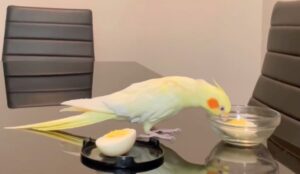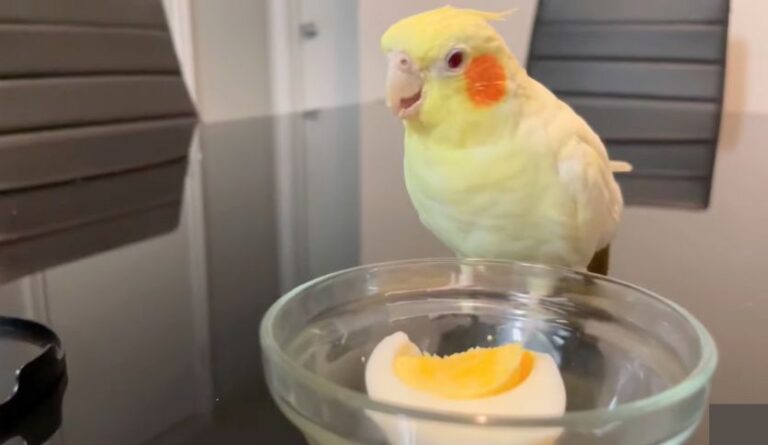Yes, cockatiels can eat eggs, but only as an occasional treat due to their high cholesterol content. Cockatiels, small and social birds commonly kept as pets, have a diverse diet that includes seeds, fruits, vegetables, and occasional animal proteins like eggs.
While eggs can provide essential nutrients, offering them in moderation is crucial to avoid potential health risks from excessive cholesterol intake. We will explore whether cockatiels can eat eggs, their nutritional benefits, and some precautions to consider when incorporating eggs into their diet.
So, if you’re a cockatiel owner wondering about the inclusion of eggs in your bird’s diet, read on to discover all the essential information you need to know.
Benefits Of Including Eggs In Cockatiel Diet
Adding eggs to a cockatiel’s diet can provide numerous benefits, including a rich source of protein, vitamins, and minerals. Eggs can support feather health and enhance the overall well-being of cockatiels.
Eggs are an excellent source of essential vitamins and minerals that contribute to cockatiels’ overall health and well-being. With their high nutritional value, eggs offer numerous benefits for these birds. Their yolks are protein-rich, which is crucial for healthy feather and muscle development. Additionally, eggs provide essential nutrients such as vitamins A, E, and folate, promoting good vision, boosting the immune system, and supporting reproductive health.
Eggs can be an essential part of a balanced diet for cockatiels. However, offering them in moderation is essential, as excessive consumption can lead to health issues. Ensure that eggs are cooked thoroughly and served without added salt or seasoning for optimal results. By including eggs in their diet, you can provide your cockatiels with a nutritious and varied menu that supports their overall well-being.
Risks Associated With Feeding Eggs To Cockatiels

Feeding eggs to cockatiels can pose potential risks that bird owners should be aware of. One of the main concerns is the potential for bacterial contamination of the eggs. Eggs can harbor bacteria such as Salmonella, which can cause gastrointestinal issues in cockatiels.
Another risk to consider is the possibility of allergic reactions in some cockatiels. Like humans, birds can develop allergies to certain foods, including eggs. Allergic reactions can manifest as digestive issues, respiratory problems, or skin irritations.
Additionally, feeding eggs to cockatiels can impact their calcium balance and may contribute to egg-binding in female birds. Eggs are rich in calcium, and excessive calcium intake can disrupt the delicate balance in a cockatiel’s body, leading to issues with egg-laying and reproduction.
Ensuring Safe Consumption Of Eggs For Cockatiels
Cockatiels can safely consume eggs as a part of their diet, providing them with essential nutrients like protein and vitamins. However, it’s important to feed eggs in moderation and ensure they are cooked thoroughly to minimize the risk of bacterial contamination.
Can Cockatiels Eat Eggs – Ensuring Safe Consumption of Eggs for CockatielsProper cooking and serving methods: cook eggs thoroughly before feeding them to your cockatiel. Raw eggs may contain harmful bacteria that can lead to digestive issues. Hard-boiled or scrambled eggs are safe options for your feathered friend. Avoid using any seasonings or additives, as they may be toxic to birds. Plain, cooked eggs are the best choice. Limiting quantity and frequency of egg consumption: moderation. Excessive egg consumption can cause an imbalance in their diet and lead to obesity. Offer eggs as an occasional treat, not as a regular part of their daily meals. Consulting with a veterinarian monitoring cockatiel’s reactions and health after introducing eggs: Observe your cockatiel after introducing eggs into its diet. Some birds may have allergic reactions or difficulty digesting eggs. Look for any signs of digestive upset, such as diarrhea or vomiting. If you notice any negative changes in your bird’s health or behavior, discontinue feeding eggs immediately and seek professional guidance from a veterinarian specialized in avian care. Feeding eggs to your cockatiel can be a nutritious and enjoyable addition to its diet when done safely and in moderation. Remember to always prioritize your pet’s health and well-being by following proper cooking methods, keeping track of egg quantity, and monitoring any adverse reactions.
Frequently Asked Questions Of Can Cockatiels Eat Eggs
Can Birds Eat Scrambled Eggs?
Yes, birds can eat scrambled eggs. It is a good source of protein for them. Make sure the eggs are fully cooked without any seasonings or additives. Offer small portions as a treat, but not as a staple in their diet.
Should I Let My Cockatiel Lay Eggs?
No, it is not recommended to let your cockatiel lay eggs. It can be stressful for them and may lead to health issues. Consult a vet for guidance.
What Can Cockatiels Not Eat?
Cockatiels should avoid foods like avocado, chocolate, caffeine, alcohol, and foods high in salt.
How Do You Handle Cockatiel Eggs?
Handle cockatiel eggs by gently picking them up with clean hands. Do not rotate or shake the eggs. Place them in a safe, warm, and quiet spot, preferably in an incubator. Do not disturb the eggs unnecessarily. Monitor the temperature and humidity levels regularly.
Conclusion
To summarize, eggs can be a nutritious addition to a cockatiel’s diet. They provide essential protein and other vital nutrients that contribute to their overall well-being. However, it is crucial to feed them in moderation and ensure that the eggs are cooked thoroughly to eliminate any potential bacteria.
Always consult a veterinarian before introducing new foods to your feathered friend’s diet. Happy feathered dining!

Hi, I’m Regina Rios. Just another bird lover who loves to share knowledge from personal experience. I’ve grown up with pet birds since childhood as my mommy also loves birds. As I can’t pet many birds in open air in my house as my mom does; I created my first bird cage on my rooftop using wood, copper wire, and a metal shed in 2018 and start collecting pet birds. Now, I have so many pet birds such as Macaws, Parrot, Cockatiel, Parakeet, and others. Not only that, if I see natural birds are injured I keep them in my house until they get well. Now, my hobby becomes my income source as my home birds have babies and I sell them to birds lover like mine. I’ve created this blog to inspire others bird owners by sharing my personal knowledge. Good Luck!

